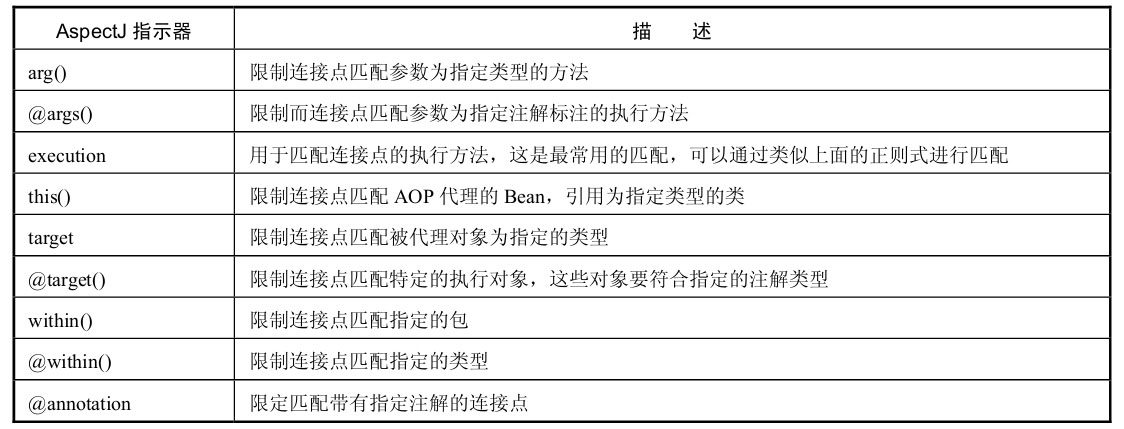spring 使用@AspectJ注解开发Spring AOP
选择切点
代码清单:打印角色接口
- package com.ssm.chapter11.aop.service;
- import com.ssm.chapter11.game.pojo.Role;
- public interface RoleService {
- // public void printRole(Role role);
- public void printRole(Role role, int sort);
- }
代码清单:RoleService实现类
- package com.ssm.chapter11.aop.service.impl;
- import org.springframework.stereotype.Component;
- import com.ssm.chapter11.aop.service.RoleService;
- import com.ssm.chapter11.game.pojo.Role;
- @Component
- public class RoleServiceImpl implements RoleService {
- // @Override
- // public void printRole(Role role) {
- // System.out.println("{id: " + role.getId() + ", " + "role_name : " + role.getRoleName() + ", " + "note : " + role.getNote() + "}");
- // }
- public void printRole(Role role, int sort) {
- System.out.println("{id: " + role.getId() + ", " + "role_name : " + role.getRoleName() + ", " + "note : " + role.getNote() + "}");
- System.out.println(sort);
- }
- }
这个类没什么特别的,只是这个时候如果把printRole作为AOP的切点,那么用动态代理的语言就是要为类RoleServi-ceImpl生成代理对象,然后拦截printRole方法,于是可以产生各种AOP通知方法。
创建切面
- package com.ssm.chapter11.aop.aspect;
- import com.ssm.chapter11.aop.verifier.RoleVerifier;
- import com.ssm.chapter11.aop.verifier.impl.RoleVerifierImpl;
- import org.aspectj.lang.ProceedingJoinPoint;
- import org.aspectj.lang.annotation.*;
- @Aspect
- public class RoleAspect {
- @DeclareParents(value = "com.ssm.chapter11.aop.service.impl.RoleServiceImpl+", defaultImpl = RoleVerifierImpl.class)
- public RoleVerifier roleVerifier;
- @Pointcut("execution(* com.ssm.chapter11.aop.service.impl.RoleServiceImpl.printRole(..))")
- public void print() {
- }
- // @Before("execution(* com.ssm.chapter11.aop.service.impl.RoleServiceImpl.printRole(..))")
- // @Before("execution(* com.ssm.chapter11.*.*.*.*.printRole(..)) && within(com.ssm.chapter11.aop.service.impl.*)")
- @Before("print()")
- // @Before("execution(* com.ssm.chapter11.aop.service.impl.RoleServiceImpl.printRole(..)) && args(role, sort)")
- public void before() {
- System.out.println("before ....");
- }
- @After("execution(* com.ssm.chapter11.aop.service.impl.RoleServiceImpl.printRole(..))")
- public void after() {
- System.out.println("after ....");
- }
- @AfterReturning("execution(* com.ssm.chapter11.aop.service.impl.RoleServiceImpl.printRole(..))")
- public void afterReturning() {
- System.out.println("afterReturning ....");
- }
- @AfterThrowing("execution(* com.ssm.chapter11.aop.service.impl.RoleServiceImpl.printRole(..))")
- public void afterThrowing() {
- System.out.println("afterThrowing ....");
- }
- @Around("print()")
- public void around(ProceedingJoinPoint jp) {
- System.out.println("around before ....");
- try {
- jp.proceed();
- } catch (Throwable e) {
- e.printStackTrace();
- }
- System.out.println("around after ....");
- }
- }


连接点
execution(* com.ssm.chapter11.aop.service.impl.RoleServiceImpl.printRole(..))
依次对这个表达式做出分析。
•execution:代表执行方法的时候会触发。
•*:代表任意返回类型的方法。
•com.ssm.chapter11.aop.service.impl.RoleServiceImpl:代表类的全限定名。
•printRole:被拦截方法名称。
•(..):任意的参数。
显然通过上面的描述,全限定名为com.ssm.chapter11.aop.service.impl.RoleServiceImpl的类的printRole方法被拦截了,这样它就按照AOP通知的规则把方法织入流程中。


测试AOP
- package com.ssm.chapter11.aop.config;
- import org.springframework.context.annotation.Bean;
- import org.springframework.context.annotation.ComponentScan;
- import org.springframework.context.annotation.Configuration;
- import org.springframework.context.annotation.EnableAspectJAutoProxy;
- import com.ssm.chapter11.aop.aspect.RoleAspect;
- @Configuration
- @EnableAspectJAutoProxy
- @ComponentScan("com.ssm.chapter11.aop")
- public class AopConfig {
- @Bean
- public RoleAspect getRoleAspect() {
- return new RoleAspect();
- }
- }
Spring还提供了XML的方式,这里就需要使用AOP的命名空间了
- <?xml version='1.0' encoding='UTF-8' ?>
- <beans xmlns="http://www.springframework.org/schema/beans" xmlns:xsi="http://www.w3.org/2001/XMLSchema-instance"
- xmlns:context="http://www.springframework.org/schema/context" xmlns:aop="http://www.springframework.org/schema/aop"
- xsi:schemaLocation="http://www.springframework.org/schema/beans http://www.springframework.org/schema/beans/spring-beans-4.0.xsd
- http://www.springframework.org/schema/context http://www.springframework.org/schema/context/spring-context-4.0.xsd
- http://www.springframework.org/schema/aop http://www.springframework.org/schema/aop/spring-aop-4.0.xsd">
- <aop:aspectj-autoproxy/>
- <bean id="roleAspect" class="com.ssm.chapter11.aop.aspect.RoleAspect"/>
- <bean id="roleService" class="com.ssm.chapter11.aop.service.impl.RoleServiceImpl"/>
- </beans>
无论用XML还是用Java的配置,都能使Spring产生动态代理对象,从而组织切面,把各类通知织入到流程当中
代码清单:测试AOP流程
- package com.ssm.chapter11.aop.main;
- import com.ssm.chapter11.aop.verifier.RoleVerifier;
- import com.ssm.chapter11.aop.verifier.impl.RoleVerifierImpl;
- import org.aspectj.lang.annotation.DeclareParents;
- import org.springframework.context.ApplicationContext;
- import org.springframework.context.support.ClassPathXmlApplicationContext;
- import org.springframework.context.annotation.AnnotationConfigApplicationContext;
- import com.ssm.chapter11.aop.config.AopConfig;
- import com.ssm.chapter11.aop.service.RoleService;
- import com.ssm.chapter11.game.pojo.Role;
- public class Main {
- public static void main(String[] args) {
- ApplicationContext ctx = new AnnotationConfigApplicationContext(AopConfig.class);
- // 使用XML使用ClassPathXmlApplicationContext作为IoC容器
- // ApplicationContext ctx = new ClassPathXmlApplicationContext("ssm/chapter11/spring-cfg3.xml");
- RoleService roleService = ctx.getBean(RoleService.class);
- Role role = new Role();
- role.setId(1L);
- role.setRoleName("role_name_1");
- role.setNote("note_1");
- RoleVerifier roleVerifier = (RoleVerifier) roleService;
- if (roleVerifier.verify(role)) {
- roleService.printRole(role, 1);
- }
- System.out.println("####################");
- //测试异常通知
- // role = null;
- // roleService.printRole(role);
- }
- }
spring 使用@AspectJ注解开发Spring AOP的更多相关文章
- Spring学习之旅(八)Spring 基于AspectJ注解配置的AOP编程工作原理初探
由小编的上篇博文可以一窥基于AspectJ注解配置的AOP编程实现. 本文一下未贴出的相关代码示例请关注小编的上篇博文<Spring学习之旅(七)基于XML配置与基于AspectJ注解配置的AO ...
- 使用@AspectJ注解开发Spring AOP
一.实体类: Role public class Role { private int id; private String roleName; private String note; @Overr ...
- Spring Aop(二)——基于Aspectj注解的Spring Aop简单实现
转发地址:https://www.iteye.com/blog/elim-2394762 2 基于Aspectj注解的Spring Aop简单实现 Spring Aop是基于Aop框架Aspectj实 ...
- Spring学习之旅(七)基于XML配置与基于AspectJ注解配置的AOP编程比较
本篇博文用一个稍复杂点的案例来对比一下基于XML配置与基于AspectJ注解配置的AOP编程的不同. 相关引入包等Spring AOP编程准备,请参考小编的其他博文,这里不再赘述. 案例要求: 写一 ...
- spring boot纯注解开发模板
简介 spring boot纯注解开发模板 创建项目 pom.xml导入所需依赖 点击查看源码 <dependencies> <dependency> <groupId& ...
- Spring:基于注解的Spring MVC
什么是Spring MVC Spring MVC框架是一个MVC框架,通过实现Model-View-Controller模式来很好地将数据.业务与展现进行分离.从这样一个角度来说,Spring MVC ...
- Spring自动装配----注解装配----Spring自带的@Autowired注解
Spring自动装配----注解装配----Spring自带的@Autowired注解 父类 package cn.ychx; public interface Person { public voi ...
- Spring使用AspectJ注解和XML配置实现AOP
本文演示的是Spring中使用AspectJ注解和XML配置两种方式实现AOP 下面是使用AspectJ注解实现AOP的Java Project首先是位于classpath下的applicationC ...
- Spring注解开发系列Ⅵ --- AOP&事务
注解开发 --- AOP AOP称为面向切面编程,在程序开发中主要用来解决一些系统层面上的问题,比如日志,事务,权限等待,Struts2的拦截器设计就是基于AOP的思想,横向重复,纵向抽取.详细的AO ...
随机推荐
- LOJ P10131 暗的连锁 题解
每日一题 day27 打卡 Analysis 对于每条非树边 , 覆盖 x 到 LCA 和 y到 LCA 的边 , 即差分算出每个点和父亲的连边被覆盖了多少次 .被覆盖 0 次的边可以和 m 条非树边 ...
- ES 基础理论 配置调优
一.简介 ElasticSearch是一个基于Lucene的搜索服务器.它提供了一个分布式多用户能力的全文搜索引擎,基于RESTful web接口.Elasticsearch是用Java开发的,并作为 ...
- 【MongoDB】在C#中使用
一.MongoClient类 在2.10.0版本中引入了MongoClient类,同时在其API中也说明了Mongo类会在将来的版本中被MongoClient替换(Note: This class h ...
- RookeyFrame 自定义数据源 返回统计查询后的视图
核心:对返回的数据进行重写 功能是这样的:上传淘宝后台的订单文件,将订单文件里面的数据导入到系统,对导入后的订单数据进行统计后再显示. Order_File:用来存上传的订单文件,格式是****.cs ...
- Ubuntu 下面手动安装 Redis
1.下载 wget http://download.redis.io/releases/redis-2.8.17.tar.gz .tar.gz cd redis- make 2.复制文件到bin目录 ...
- AttributeError: module 'tensorflow' has no attribute 'set_random_seed'
anaconda3 python3.7 安装好tensorflow 后出现上面的问题,原因是安装的tensorflow版本是2.0的,所以使用以前的代码tensorflow中的函数不兼容.
- Mujin Programming Challenge 2017题解
传送门 \(A\) 似乎并不难啊然而还是没想出来-- 首先我们发现对于一个数\(k\),它能第一个走到当且仅当对于每一个\(i<k\)满足\(x_i\geq 2i-1\),这样我们就可以把所有的 ...
- 《自制编程语言--基于C语言 郑钢》学习笔记
<自制编程语言>学习笔记 本仓库内容 <自制编程语言>源码 src/sparrow.tgz <自制编程语言>读书笔记 docs/* <自制编程语言>样章 ...
- Linux shell head 命令
输出前25行 head -n25 input.txt head -n input.txt head - input.txt 输出前5个字符 head -c5 test.cpp head -c test ...
- andriod studio命名规范
标识符命名法标识符命名法最要有四种: 1 驼峰(Camel)命名法:又称小驼峰命名法,除首单词外,其余所有单词的第一个字母大写. 2 帕斯卡(pascal)命名法:又称大驼峰命名法,所有单词的第一个字 ...
